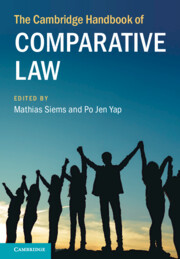Book contents
- The Cambridge Handbook of Comparative Law
- The Cambridge Handbook of Comparative Law
- Copyright page
- Contents
- Figures
- Tables
- Contributors
- Preface
- Abbreviations
- 1 Introduction
- Part I Methods of Comparative Law
- 2 Traditional Methods
- 3 Historical-Jurisprudential Methods
- 4 Critical Methods
- 5 Culture and Comparative Law Methodology
- 6 Linguistic Approaches
- 7 Qualitative Fieldwork
- 8 New Institutional Economics
- 9 Empirical Methods
- 10 Machine-Learning Methods
- Part II Legal Families and Geographical Comparisons
- Part III Central Themes in Comparative Law
- Part IV Comparative Law beyond the State
- Index
5 - Culture and Comparative Law Methodology
from Part I - Methods of Comparative Law
Published online by Cambridge University Press: 26 January 2024
- The Cambridge Handbook of Comparative Law
- The Cambridge Handbook of Comparative Law
- Copyright page
- Contents
- Figures
- Tables
- Contributors
- Preface
- Abbreviations
- 1 Introduction
- Part I Methods of Comparative Law
- 2 Traditional Methods
- 3 Historical-Jurisprudential Methods
- 4 Critical Methods
- 5 Culture and Comparative Law Methodology
- 6 Linguistic Approaches
- 7 Qualitative Fieldwork
- 8 New Institutional Economics
- 9 Empirical Methods
- 10 Machine-Learning Methods
- Part II Legal Families and Geographical Comparisons
- Part III Central Themes in Comparative Law
- Part IV Comparative Law beyond the State
- Index
Summary
The misconception of culture is responsible for many difficulties in comparative law. This chapter suggests that a general concept of culture is inevitably distorting or empty, and that any meaningful talk of culture can only take place upon microscopic elements. Cultural elements are different in their relevance to the constitution of the problem of life and accordingly the problem of law; the enquiries into the cultural impacts upon law must be based upon the relevance of a particular element to a particular law. The insider’s view to apprehend culture is a fallacy; the outsider’s view is the only way possible to know a culture. Taking culture as a purely subjective construction is another common misconception while the objectivity of cultural elements is essential for the proper understanding of culture and the methodological improvement of comparative law.
- Type
- Chapter
- Information
- The Cambridge Handbook of Comparative Law , pp. 72 - 90Publisher: Cambridge University PressPrint publication year: 2024

